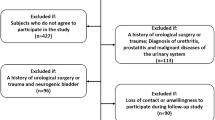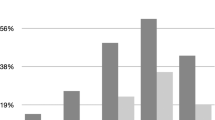Abstract
The purpose of this study was to elucidate correlations between different biochemical measurements of androgen deficiency and clinical symptoms in male residents of Taiwan. An investigation of the serum biochemical markers for androgen deficiency in 650 males, including total testosterone, calculated free testosterone, and bioavailable testosterone, was conducted. Measurements of clinical symptoms were obtained using a questionnaire of the androgen deficiency in the aging male (ADAM) by St Louis University (SLQ). Correlations among the biochemical markers, correlations of the biochemical markers and age, and relationships between the biochemical markers and the SLQ were evaluated. The sensitivity and specificity of the SLQ were determined. Bioavailable and calculated free testosterone correlated better with age than did total testosterone. Eighty percent of the men had a positive SLQ, and 20% had a negative SLQ. The percentage of positive SLQ results increased with age. No statistically significant difference was noted between the biochemical markers of bioavailable and calculated free testosterone levels and the SLQ status except for men aged over 70 years. The SLQ in this study showed an acceptable sensitivity of about 80%, but the specificity was poor (about 20%). In conclusion, bioavailable testosterone and calculated free testosterone were more-closely correlated with age and may be better biochemical markers for androgen deficiency. SLQ might not be a suitable single measurement for androgen deficiency and should be used together with biochemical markers.
This is a preview of subscription content, access via your institution
Access options
Subscribe to this journal
Receive 8 print issues and online access
$259.00 per year
only $32.38 per issue
Buy this article
- Purchase on Springer Link
- Instant access to full article PDF
Prices may be subject to local taxes which are calculated during checkout


Similar content being viewed by others
References
Morales A, Lunenfeld B . Investigation, treatment and monitoring of late-onset hypogonadism in males. Official recommendations of ISSAM. International Society for the Study of the Aging Male. Aging Male 2002; 5: 151–158.
Davidson JM, Chen JJ, Crapo L, Gray GD, Greenleaf WJ, Catania JA . Hormonal change and sexual function in aging men. J Clin Endocrinol Metab 1983; 57: 71–77.
Comhaire FH . Andropause: hormone replacement in the ageing male. Eur Urol 2000; 38: 655–662.
Vermeulen A, Verdonck L, Kaufman JM . A critical evaluation of simple methods for the estimation of free testosterone in serum. J Clin Endocrinol Metab 1999; 84: 3666–3671.
Morley JE, Patrick P, Perry III HM . Evaluation of assays available to measure free testosterone. Metabolism 2002; 51: 554–559.
Morley JE, Charlton E, Patrick P, Kaiser FE, Cadeau P, McCready D et al. Validation of a screening questionnaire for androgen deficiency in aging male. Metabolism 2000; 49: 1239–1242.
Barrett-Connor E, Von Muhlen DG, Kritz-Silverstein D . Bioavailable testosterone and depressed mood in older men: the Rancho Bernardo Study. J Clin Endocrinol Metab 1999; 84: 573–577.
Synder PJ, Peachey H, Hannoush P, Berlin JA, Loh L, Holmes JH et al. Effect of testosterone treatment on bone mineral density in men over 65 years of age. J Clin Endocrinol Metab 1999; 84: 1966–1972.
Harman SM, Metter EJ, Tobin JD, Pearson J, Blackman MR . Longitudinal study of aging. Longitudinal effects of aging on serum total and free testosterone levels in healthy men. J Clin Endocrinol Metab 2001; 86: 724–731.
Feldman HA, Longcope C, Derby CA . Age trends in the levels of serum testosterone and other hormone in middle age men: longitudinal results of the Massachusetts Male Aging Study. J Clin Endocrinol Metab 2002; 87: 589–596.
Morley JE, Kaiser FE, Perry III HM . Longitudinal changes in testosterone, luteinizing hormone and follicle stimulating hormone in healthy older men. Metabolism 1997; 46: 410–415.
Tsujimura A, Matsumiya K, Matsuoka Y, Takahashi T, Koga M, Iwasa A et al. Bioavailable testosterone with age and erectile dysfunction. J Urol 2003; 170: 2345–2347.
Christ-Crain M, Mueller B, Gasser TC, Kraenzlin M, Trummler M, Huber P et al. Is there a clinical relevance of partial deficiency of the aging male. J Urol 2004; 172: 624–627.
Morales A, Heaton JP . Hormonal erectile dysfunction. Evaluation and management. Urol Clin North Am 2001; 28: 279–288.
Foresta C, Caretta N, Rossato M, Garolla A, Ferlin A . Role of androgens in erectile function. J Urol 2004; 171: 2358–2362.
Morales A, Heaton JP . Hypogonadism and erectile dysfunction: pathophysiological observations and therapeutic outcomes. BJU Int 2003; 92: 896–899.
Tenover JS . Effects of testosterone supplementation in the aging male. J Clin Endocrinol Metab 2001; 86: 1092–1097.
Morley JE, Perry III HM, Kaiser FE, Kraenzle D, Jensen J, Houston K et al. Effects of testosterone replacement therapy in old hypogonadal males: a preliminary study. J Am Geriatr Soc 1993; 41: 149–155.
Wang C, Swedloff RS, Iranmanesh A, Dobs A, Snyder PJ, Cunningham G et al. Transdermal testosterone gel improve sexual function, mood, muscle strength, body composition parameters in hypogonadal men. J Clin Endocrinol Metab 2000; 85: 2839–2848.
Acknowledgements
This study was in part financially supported by the Taiwanese Association of Andrology.
Author information
Authors and Affiliations
Corresponding author
Rights and permissions
About this article
Cite this article
Lin, Y., Hwang, T., Chiang, H. et al. Correlations of androgen deficiency with clinical symptoms in Taiwanese males. Int J Impot Res 18, 343–347 (2006). https://doi.org/10.1038/sj.ijir.3901417
Received:
Revised:
Accepted:
Published:
Issue Date:
DOI: https://doi.org/10.1038/sj.ijir.3901417
Keywords
This article is cited by
-
Male sexual dysfunction in Asia
Asian Journal of Andrology (2011)
-
The relationship between hypogonadism and erectile dysfunction
International Journal of Impotence Research (2008)



